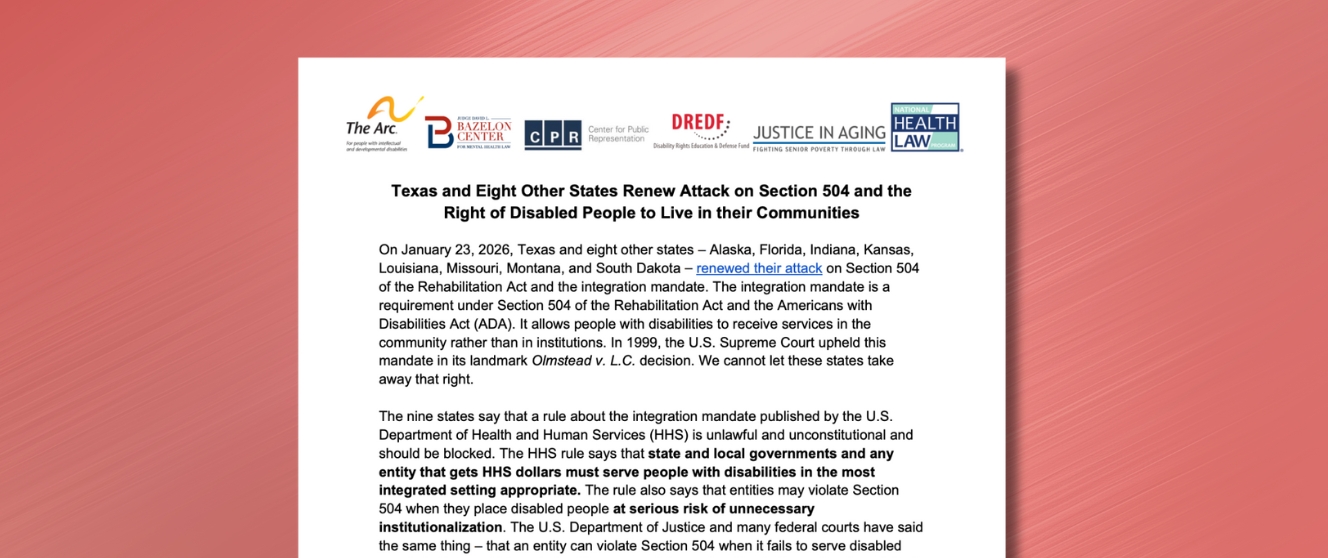
For Immediate Release — November 16, 2005
For more information, contact:
- Julia Epstein, Disability Rights Education & Defense Fund, (510) 644-2555 (x. 241), jepstein@dredf.org
- John Buchanan, Heller Ehrman LLP, (415) 772-6715, john.buchanan@hellerehrman.com
- Tim Ayers, Ayers Associates—National Senior Citizens Law Center, (202) 857-9734, tim@ayersassociates.net
- Ralph Sanders, American Council of the Blind, (702) 735-2484, ralphsanders_1@juno.com
SSA Fails to Provide Accessible Communications
The American Council of the Blind and a group of individuals who are blind or have vision impairments today filed a class action lawsuit against the U.S. Social Security Administration (SSA), alleging that the agency fails to provide the most basic accommodations to its blind applicants and beneficiaries. Specifically, the SSA communicates with its hundreds of thousands of blind applicants and beneficiaries in standard print that they cannot read, and terminates benefits even if the blind applicant or beneficiary was never made aware of a problem with his or her benefits. The suit was filed in the U.S. District Court for the Northern District of California.
“It is an outrage that SSA, the agency that should know more about disability than any other, sends critical information to blind and visually impaired beneficiaries in print only,” states Arlene Mayerson, Directing Attorney of the Disability Rights Education and Defense Fund, one of the attorneys representing the plaintiffs. Also representing the SSA beneficiaries are the National Senior Citizens Law Center, the Oregon Advocacy Center, and pro bono counsel Heller Ehrman, LLP.
Wondie Russel, Heller Ehrman attorney said:
“More than 25 years after the passage of federal disability laws requiring that blind and visually impaired individuals receive material in ‘alternative format,’ the SSA still has no real viable, cost-effective, and equal alternative for communicating with its blind beneficiaries. Instead, the SSA continues to takes dire action—such as stopping or reducing benefits payments—without providing accessible notice. Banks and public utilities provide blind and visually impaired individuals with information using alternative formats such as Braille, audiotape, and digital files that can be read aloud by computer software. The SSA has done little — or nothing — to assist its blind beneficiaries, despite numerous appeals.”
Christopher Gray, President of the American Council of the Blind explained:
“Blind and visually impaired Americans face one of the highest unemployment rates of any sector of the population. This places a large percentage of the blind and visually impaired in the position of being dependent on the Social Security Administration for the means to survive. Yet we cannot get them to recognize us as meaningful citizens with the same basic communications needs as everyone else.”
Plaintiffs in the lawsuit have been reduced to borrowing money from relatives, have gone into debt, or have gone without benefits as a result of SSA’s failure to give them effective notice of its actions — they can suddenly receive reduced benefits, or no benefits at all, leading to extreme financial hardship. “Imagine receiving a phone call from the bank that your checks are bouncing and fees are mounting,” suggests American Council of the Blind Executive Director Melanie Brunson. “If you rely on automatic deposit of your benefits check, without notice in a format that you can read, deposits stop, setting off a chain of bounced checks, bank fees, and bad credit.”
The National Eye Institute reports that blindness or low vision affects 3.3 million Americans age 40 or older, a figure expected to reach 5.5 million by the year 2020. In addition, there are 2.8 million people over the age of 70 who are blind or have low vision. The most common causes of vision impairment in older Americans include age-related macular degeneration, glaucoma, cataracts, and diabetic retinopathy.
“Vision impairments are especially prevalent among the elderly, with almost a quarter of Americans over the age of 80 classified as blind or having low vision according to data published by the government’s National Eye Institute,” explains Gerald McIntyre, Directing Attorney of the National Senior Citizens Law Center. “In fact, people over the age of 80 account for 69 percent of all Americans who are blind.”
Although SSA policy allows blind beneficiaries to request that critical notices be read to them over the phone, few beneficiaries have been notified of this option and those who choose it find it inconsistent, unreliable, and inadequate for understanding the complex information involved.
The class action suit demands that SSA offer correspondence and program materials in alternative formats to its beneficiaries, recipients, and representative payees with vision impairments.
Founded in 1979 by people with disabilities and parents of children with disabilities, the Disability Rights Education and Defense Fund, Inc. (DREDF) is a national law and policy center dedicated to protecting and advancing the civil rights of people with disabilities through legislation, litigation, advocacy, technical assistance, and education and training of attorneys, advocates, persons with disabilities, and parents of children with disabilities. For more information, go to dredf.org.
Heller Ehrman LLP has more than 700 attorneys and professionals in 12 offices worldwide. Heller Ehrman is committed to a multidisciplinary approach to the practice of law, drawing upon legal, scientific and industry knowledge from across the firm to build the best legal teams for both corporate and pro bono clients. In 2005, Heller Ehrman was ranked 8 th in the nation for commitment to pro bono legal service by The American Lawyer.
The National Senior Citizens Law Center advocates nationwide to promote the independence and well-being of low-income elderly individuals and persons with disabilities. NSCLC provides technical assistance and training to attorneys and other advocates and is active in litigation and policy advocacy with a strong focus on income security and health care.For more information, go to the organization’s website at www.nsclc.org.
The Oregon Advocacy Center (OAC) is an independent non-profit organization which provides legal advocacy services for people with disabilities anywhere in Oregon. OAC is designated under federal law as the protection and advocacy system for Oregon, but it is not a part of the state or federal government. OAC has attorneys and advocates who assist people with disabilities. For more information, go to www.oradvocacy.org.
The American Council of the Blind is the nation’s leading consumer based advocacy organization working on behalf of blind and visually impaired Americans and has more than 70 state and special-interest affiliates throughout the United States. The national office of the organization is located in Washington, D.C. For more information about the ACB, visit the web site at http://www.acb.org.

